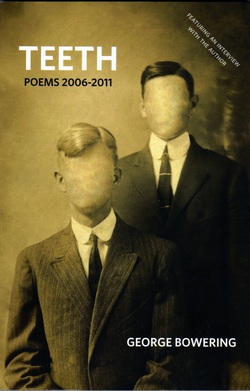
This is how George Bowering’s 1991 poem “Death” begins:
I’m going to write a poem about life & death, I said,
but mostly about death. But you are always doing that, said D,
your last poem was about death. The poem before that one was
about death. In fact if you looked at all your writing, especially
the poems, you would find pretty near nothing but death. A lot
of the time you seem to be laughing about it, but that doesn’t
fool anyone. (Urban Snow 23)
Twenty years later in his latest collection, Teeth, he’s still writing poems about death, aging, the slow dying of our planet, and the missed opportunities of a now long distant boyhood, so I guess it’s nothing to worry about. Though it does worry me that he has received such little recognition from the ecopoetry/ecocriticism writers. His “Summer Solstice” (1976) and Kerrisdale Elegies (1984) are two of the most powerful works anywhere of ecopoetry, and written – according to Wikipedia – much before that necessarily death-concerned category was invented.
Being still one who reads poetry mostly for what I can learn about writing poetry, I was attracted most to the unexpected forms in this book – especially to the several poems Bowering has constructed here out of lists of
 RSS Feed
RSS Feed